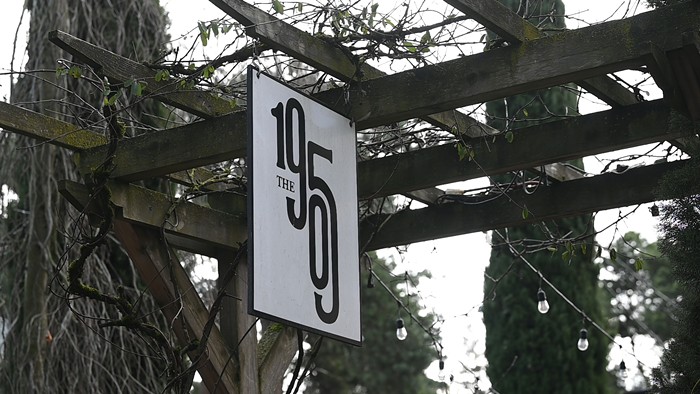BEFORE A FRIEND talked him out of it, Sufjan Stevens considered calling his new record Oregon. The shift was for the best. While largely set in and inspired by the Beaver State, Stevens' Carrie & Lowell plumbs depths far more personal: the death of his mother.
Carrie died in 2012. While she was alive, Stevens and his siblings spent precious little time with her. Saddled with myriad mental illnesses, from schizophrenia to depression and bipolar disorder, Carrie was often dependent on drugs and alcohol. She spent some time homeless, and never really felt herself equipped to care for the children. She abandoned the family when Stevens was a year old.
Around the time Stevens turned five, Carrie married Lowell Brams. Lowell lived in Eugene, and at his urging, the kids spent the next three summers in Oregon. Stevens remembers that time fondly, as Carrie was at her most stable. But Carrie and Lowell split. And while Stevens maintains a close relationship with his stepfather to this day (Lowell operates Stevens' label, Asthmatic Kitty), Carrie all but disappeared from her children's lives, appearing only in letters and for the occasional holiday.
When Carrie died, Stevens fell into a deep depression. "I found myself kind of feeling like my mother's ghost was inhabiting me," he told Uncut earlier this year. "I had a lot of pretty dark moments."
Hoping to deflect, Stevens attempted to keep working as he had: staying busy, writing fictional lyrics (he has a graduate degree in creative writing). But it didn't work. He had to turn inward. "In writing about it on this album, I was in pursuit of meaning, of justice, of reconciliation," he told Pitchfork.
Attempting to keep his head up, Stevens traveled frequently. He took long bike trips through North Dakota, Montana, and Wyoming. He camped and stayed in little motels. He drove, too, exploring the barren flats of Eastern Oregon and Washington. And, with a guitar, he wrote and recorded along the way.
In 2013 he visited Tucker Martine's Flora Recording and Playback studio in Portland. (Martine's wife, Laura Veirs, sang a bit and is credited on the album, although she may not have even made the final cut. According to Veirs, Stevens gave her the credit "because he likes me.") He dropped in at other studios across the country and used his own in Brooklyn. And according to the album's liner notes, "Some tracks were also recorded on an iPhone in a hotel room in Klamath Falls, Oregon."
Altogether, Stevens recorded 30 or 40 songs, but didn't know what to do with them. He feared seeming indulgent, or to be reveling in his misery. To him, the work seemed artless, but friends thought otherwise. At their urging, and with the help of composer Thomas Bartlett—who also pushed against the title Oregon—the recordings were culled to the brisk 11 tracks that make up Carrie & Lowell.
It is, as the majority of Stevens' proper full-lengths are, a heartbreaking work of staggering genius. To say it is his "best"—or that there could even be a "best"—undervalues the sheer breadth of Stevens' oeuvre. From the tender, wistful sketches of Seven Swans, to the triumphant history lessons of Illinois, to the spiraling self-doubt, confusion, and otherworldly crescendos of The Age of Adz, Stevens' records dovetail with startlingly different moods and phases, though they all share profound sentiment, unsurpassed orchestration, and unshakeable melody. The same goes for Carrie & Lowell. A bare, unflinching, and nuanced reckoning of love, blood, and death, it is a state unto itself.
And while it feels strange to realize it, I know what record I'll put on when my own mother passes.
SONG BY SONG
"Death with Dignity"
In 1994, Oregon became the first state to allow doctor-assisted suicide for patients with terminal illness. Stomach cancer took Stevens' mother, though it's unclear if the "Death with Dignity" title refers to the way she ultimately went or if it is a literary device meant to color the record's emotional tenor. Either way, Stevens has said in interviews that he was able to see his mother in the ICU before she passed, and that in professing his love unconditionally he found some peace.
"Should Have Known Better"
In a song seemingly about regrets and leaving them behind, Stevens finds brief respite, singing: "I'm light as a feather/I'm bright as the Oregon breeze."
"All of Me Wants All of You"
Twice Stevens visits on Spencer's Butte, located at the south end of Eugene. Hiking trails lead to a rocky summit with a view of the city; it is Eugene's highest point. "Found myself on Spencer's Butte," Stevens sings. "Traced your shadow with my shoe." And, later in the song: "Saw myself on Spencer's Butte/Landscape changed my point of view."
"Drawn to the Blood"
With biblical and fantasy imagery, "Drawn to the Blood" is one of only two songs on the record without a direct or discernible reference to Oregon.
"Eugene"
When Stevens and his siblings spent their summers with their mother and stepfather Lowell in Oregon, Lowell worked at a bookstore in Eugene. The city was likely their home base. "Eugene" is sweet and wistful, a remembrance of the best times Stevens spent with his mother. He mentions swimming lessons at Emerald Park, a public pool on the city's north end. The song's opening lines encapsulate the momentary bliss: "Light struck from the lemon tree/What if I'd never seen hysterical light from Eugene?"
"Fourth of July"
With deep, somber tidal waves of synth, "Fourth of July" makes the hair on the back of my neck stand up. Here, Stevens seems to be in the hospital, making arrangements after his mother has finally passed. From another plane, Carrie seems to respond: "Why do you cry?" She references the Tillamook Burn, a two-decade string of forest fires that destroyed 355,000 acres. Most of the fires were started by man. "Tell me, what did you learn from the Tillamook Burn? Or the Fourth of July?" Stevens sings in what I believe is his mother's voice. "We're all gonna die."
"The Only Thing"
After the elemental heartbreaker that is "Fourth of July," Stevens finds reasons to go on in "The Only Thing." To a list that includes constellations and "Cross hatch, warm bath," Stevens adds, "Signs and wonders: sea lion caves in the dark," a reference to the Oregon Coast tourist destination west of Eugene.
"Carrie & Lowell"
"Carrie & Lowell" seems to chronicle spending time outdoors in the summer and road-tripping around Oregon by car. "Covered bridge, I scream," Stevens sings. "Cottage Grove shade, invite me." Cottage Grove is a small town 30 minutes south of Eugene by car.
"John My Beloved"
The second song on the album with no overt or discernible references to Oregon, the meaning of "John My Beloved" is murky. As I read it, it speaks of a tryst when Stevens was grieving his mother's death.
"No Shade in the Shadow of the Cross"
Here again Stevens seems to chronicle his difficult, debauched searching after Carrie's death. He drinks, has sex, and wanders. "Drag me to hell in the valley of the Dalles," Stevens sings of the small city 80 miles east of Portland on the Columbia River.
"Blue Bucket of Gold"
Supposedly found in 1845, the Blue Bucket Mine is an Oregon legend. In a wagon train, some thought they'd discovered gold. Others decried it as copper. Regardless, the site and its potential riches remain lost. "My blue bucket of gold," Stevens sings, presumably to his mother, "Friend, why don't you love me?" In closing the record, it wonders: What of all this—the relationship, the abandonment, the love, the loss, the ensuing understanding—is real?



















